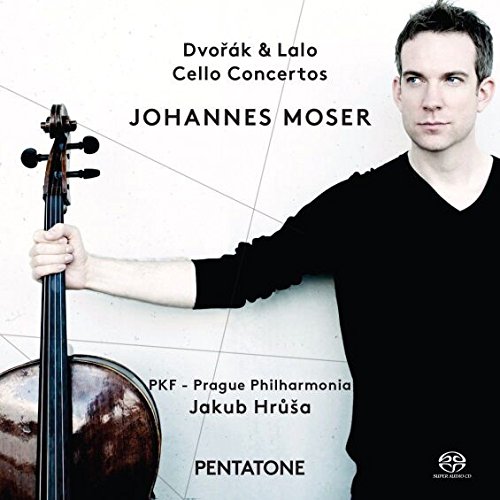DVOŘÁK; LALO Cello Concertos
View record and artist detailsRecord and Artist Details
Composer or Director: Antonín Dvořák, Edouard(-Victoire-Antoine) Lalo
Genre:
Orchestral
Label: Pentatone
Magazine Review Date: AW2015
Media Format: Super Audio CD
Media Runtime: 66
Mastering:
DDD
Catalogue Number: PTC5186 488

Tracks:
| Composition | Artist Credit |
|---|---|
| Concerto for Cello and Orchestra |
Antonín Dvořák, Composer
Antonín Dvořák, Composer Jakub Hrusa, Conductor Johannes Moser, Cello Prague Philharmonia |
Author: Rob Cowan
The Dvořák Concerto enjoys a symphonically conceived account of the orchestral part. Moser’s first entry is strong and confident, and when he goes racing off into the main body of the movement, his playing is lively but without signs of either undue haste or excessive pressure. It’s all so incredibly natural, the second subject as tender as anyone could wish for. Skilfully bowed arpeggios later on really glisten, and that elegiac passage at the first movement’s centre (at 9'19") truly touches the heart. So does the Adagio (with beautifully balanced woodwinds at the outset), while in the finale, which sets out as a bracing jog-trot, Moser makes light of the various technical challenges that Dvořák poses him.
The recorded sound is, like the playing, absolutely top-notch. Rivals in the Dvořák include Alisa Weilerstein (who likes to live dangerously – and, as I’ve previously said in these pages, Jiří Bělohlávek’s predominantly symphonic view of the score provides a powerful but disciplined framework for her spontaneous, tonally full-bodied playing), Truls Mørk and Mariss Jansons (light and felicitous), and Angelica May with Václav Neumann (the slow movement’s cadenza especially affecting). But this new version is up there with the best of them and could happily serve as a credible first choice, at least in the digital stakes.
Discover the world's largest classical music catalogue with Presto Music.

Gramophone Digital Club
- Digital Edition
- Digital Archive
- Reviews Database
- Full website access
From £8.75 / month
Subscribe
Gramophone Full Club
- Print Edition
- Digital Edition
- Digital Archive
- Reviews Database
- Full website access
From £11.00 / month
Subscribe
If you are a library, university or other organisation that would be interested in an institutional subscription to Gramophone please click here for further information.




